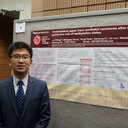Lymphoma associated hemophagocytic syndrome: A single-center retrospective study.
Sleutelwoorden
Abstract
To improve the understanding of lymphoma associated hemophagocytic syndrome (LAHS) and find an effective treatment for this fatal disease, 57 patients with LAHS were retrospectively reviewed. The most common histopathological type was extranodal natural killer (NK)/T-cell lymphoma, nasal type (ENKL) (45.61%). Patients with B-cell LAHS were significantly older (P<0.001), and exhibited a higher triglyceride level (P=0.012), lower serum ferritin level (P=0.014) and lower plasma Epstein-Barr virus DNA (P<0.001) compared with patients with T/NK-cell LAHS. The median survival time of all patients was 43 days, and patients with B-cell (n=14) and T/NK-cell (n=43) LAHS had a median survival time of 55 and 40 days, respectively (P=0.797). Compared with patients who were treated based on HLH-2004 protocols combined with multidrug chemotherapy, those without chemotherapy had a reduced prognosis (P=0.002). The patients that underwent hematopoietic stem cell transplantation (HSCT) following chemotherapy had a significantly improved overall survival (OS) compared with patients that did not undergo HSCT (P=0.001). Patients with B-cell LAHS treated with rituximab (P=0.015) and patients with ENKL treated with L-asparaginase/pegaspargase (L-asp/peg) (P=0.009) had an improved prognosis compared with patients not treated with these drugs. In the T/NK-cell LAHS group, patients treated with chemotherapy containing gemcitabine did not exhibit an improved OS compared with those not treated with gemcitabine (P=0.326). Furthermore, multivariate analysis demonstrated that long diagnosis time and poor performance status were independent prognosis factors for all patients with LAHS. The present study indicated that survival time does not differ between patients with B-cell LAHS and patients with T/NK-cell LAHS. Early diagnosis and appropriate immunochemotherapy plus HSCT are essential to achieve improved outcomes. The outcome of patients with B-cell LAHS may be significantly improved following treatment with rituximab. L-asp/peg-containing regimens are promising treatments for patients with NK/T-cell LAHS.




